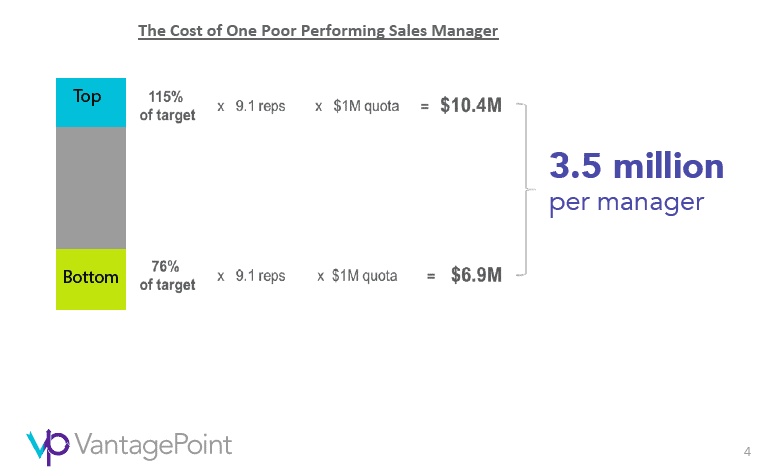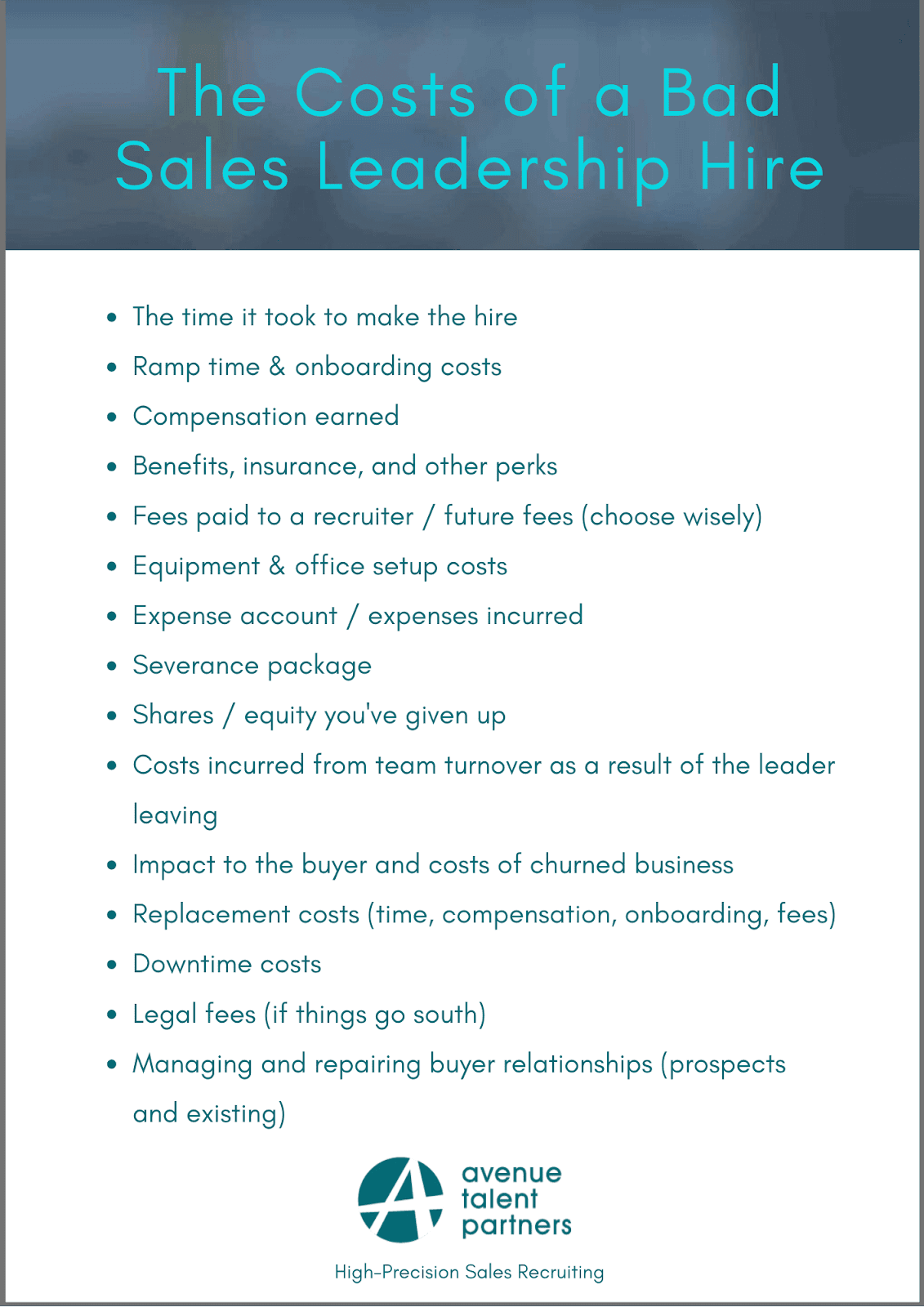
What’s the Cost of Losing a Really Good VP of Sales?
Ready for a wakeup call?
“70% of Saas First VP Sales don’t make it to 12 Months. It’s one of the most common, and also most devastating mishires in startups.”
– Jason Lemkin
A bad hiring decision can cost you a TON of money, but for a startup, it could make-or-break your business.

We were recently introduced to a Founder who has been suffering the effects of hiring the wrong SVP of Sales for the last six months.
This was their first executive hire after their initial round of funding.
While the person was a referral from a trusted source, they didn’t realize the importance of hiring for their stage and the work required –– *facepalm*.
That hire churned out within 9 months and nearly took the company with him on the way out.
The numbers speak for themselves… this snafu has already cost them over 7-figures and they’re still working through the cleanup. Talk about the costs of a bad hire coming back to bite you, yikes!
As a startup, there’s absolutely nothing more important than developing a hiring process that eliminates the wrong assumptions and funnels the right sales leaders in.
It starts from the top and this key hire is INSTRUMENTAL to your success. This isn’t a decision you want to take lightly.
Intentionality is key. Take the time to understand what your business truly needs and why, build a systematic hiring process, and ensure that you’re bringing on the RIGHT people with the RIGHT experience for the job at your STAGE.
Otherwise, you could be setting yourself up to be the next example of a bad hiring decision with a negative impact that’s hard to recover from.
Let’s break down the actual costs of a bad hire
If the average VP of Sales sticks around for less than 19 months, how many times over are you willing to pay for the same mistake?
A bad sales leadership hire can have drastic, lasting consequences for your startup.
For example, if they’re not the right leader and they go out and hire a bunch of reps that aren’t right for your business, the costs of a bad hire exponentially increase:

Think about it, according to Dr. Bradford Smart (author of Topgrading), the estimated cost of a bad hire ranges from 5 to 27 times the amount of a person’s salary.
That’s a whopping cost to pay as a startup!
Wondering where all that money is coming from? This chart lays out all the costs:

A bad hire can rip through your startup like a tsunami, so it’s best to avoid the disaster in the first place.
** Free tool alert ** If you’re curious about what a bad sales leadership hire could cost your startup, check out this nifty calculator.
Think you hired wrong? Look out for these warning signs…
Some interviews feel picture perfect. The candidate ticks all the boxes, says the right things, has a great personality, is a culture fit, and you’re convinced they’re the sales leader of your dreams.
A week later and you’ve received their signed offer letter, ecstatic that you can move on to bigger and bright things.
Sounds like the dream hiring scenario, right?
Well, it’s not so simple –– a fantastic interview doesn’t necessarily translate into a scaling business..
Even if everything seems great at the start, you need to be prepared to identify your bad hires quickly BEFORE they become a huge liability.
Here are some red flags to look out for post-hiring process:
Turns to you to make all of the decisions: You hired them to take this important task off of your plate, not to add to it. If you’re getting looped into every single decision, meeting, and idea, what’s really going on here?
Throwing money at every problem: If every challenge is met with a solution to throw money at the problem or buy the latest shiny ‘must-have’ object, pause, look at your expenses, and understand why this is the go-to response.
Won’t give specific numbers: If you’re asking specific questions and getting vague answers, it’s a tell-tale sign that the person is hiding something from you.
Can’t meet deadlines: If your expectations have been set and there has been little to no proactive communication about the status of a deadline, and it’s ultimately missed, this is unacceptable. It starts at the top and what example does that set for the rest of the team, especially if it’s the rule versus the exception?
Unwilling to take steps to grow & improve their skillset: Startups thrive on adapting, evolving, and expanding their reach in their market. That means continually looking for new opportunities and developing new skills that correspond with those opportunities. If your sales leader isn’t growing or can’t adapt, how do you think the rest of your team is going to act?
Making excuses: This is NOT the way you want your sales leadership to respond to feedback or questioning. It’s a clear sign that they don’t want to take responsibility for their actions. It’s one thing to point out problems, it’s a whole other ball of wax to solve them.
Lack of interest in the company/industry: Startups need leaders that are bought into the mission to galvanize the right people together and propel the business forward. If your new sales leader isn’t showing interest in the company, it could mean you have an alignment problem.
Speaks poorly about your customers: Has your new hire gotten off a call with a high-profile customer and then badmouthed them in front of you… or even worse their team? Just think if the sales leader of a company you do business did the same thing, how would you respond?
Catching these red flags early and understanding them to see if it’s an isolated situation or the standard operating procedure is key to minimizing the losses of a bad hire and preparing yourself to hire a replacement.
The longer the wrong person festers in your startup’s sales leadership, the worse the fallout is going to be.
The Most Common Hiring Mistakes
We’ve gone over some of the big red flags to watch out for, but you know the best way to avoid those issues?
Create a winning process and hire the right person from the get-go!
Part of my secret sauce is using a hiring scorecard. It’s an effective tool in my kit that drastically reduces the odds of a costly bad hire.
My methodology on how to create and use a hiring scorecard can be found here along with a downloadable template.
Some of the most common hiring mistakes I see:
- Getting caught up in the shiny objects
It’s impossible to know what a great hire looks like for your business because you’re not a sales leader and have never been in sales. And that’s okay!
However, you need to make sure that the search firm you’re working with specializes in finding the right type of sales leader you need to grow your business. Can they truly source, engage, and vet the right person, who has the skill set required for the stage you’re at?
It’d be like me trying to hire an engineer. They can compel me with what they say in interviews, but how do I know if they can really do the job?
If you need help, here’s what to look out for as you vet a sales recruiting firm –– OR you can just trust me with the job (insert shameless plug)
- Going with your gut
Biases have a TON of power over our decision-making process. So when it comes to hiring, you need to be ironclad with your feelings, gut instincts, intuition, all of it.
For example, I’ve talked to many startup CEOs who think that any candidate over 40 is out to pasture. This couldn’t be further off the mark.
On a recent sales leadership search, we had 4 candidates and received major pushback on one person that seemed ‘too experienced’ for the job. But we leaned into our process, hired that candidate, and now he’s leading the charge through this pandemic to help the company truly grow and thrive.
The lesson? Keep your gut out of your hiring process!
- Hiring for where you want to be (not where you’re at)
As a startup, you’ll be working through several growth phases as you scale your business.
So why would you hire a VP with a ton of enterprise sales experience when your product isn’t ready for that market?
Focus your hiring efforts on bringing in people who can take the right actions NOW to grow into the vision of where you’d like your startup to go.
Then once you get there, you can reassess and expand your team.
- Giving too much weight to referrals
Just because your board “knows the right guy” for the job doesn’t mean it’s going to be a slam dunk. Regardless of where your candidates come from, ALWAYS stick to your hiring process (and hiring scorecard) before bringing them on.
One of our clients hired the SVP of Sales candidate that their board recommended because they thought the person would be perfect for the role. But guess what, they ended up churning in less than 8 months!
Now we’re working with them to get the right person in and clean up the wreckage…
- Having the wrong people involved in the hiring process
I’ve seen people thrown into the process who have never hired someone before –– yikes! They don’t know what great looks like, create a horrible candidate experience, yet somehow have a seat at the decision-making table.
Be intentional with all the people involved in your hiring process, make sure they understand the scorecard, and outline everyone’s roles in the hiring committee before and after each step.
- Figuring out what you need to do as you go along
How can you hire the right person when you don’t know what you’re looking for and you don’t have a process in place to get it right? Newsflash –– it’s impossible!
Trying to wing it during the hiring process is the kiss of death. You’ll be turning off A-players while dramatically increasing the odds of hiring the wrong person.
Take the time to outline everything BEFORE you start your search and you’ll be much better off in the long run.
It’s okay to not have all of the answers. If you haven’t hired a sales leader before or are reeling from making a bad hire, asking for help is the best thing you can do for your business.
Make no mistake, this role is mission-critical – without sales, you don’t have a successful company.
It’s as simple as that.
Asking for help is one of the best things you can do. Just know not all recruiters are created equal. It’s just as important to hire the right firm to find the right person for you while representing your brand well in the marketplace as it is to avoid the mishire in the first place.
Never fear, help is here, this guide lays out all the details.
Wrapping up
Fun fact, 69% of employers made a bad hiring decision based on a flawed interview process with 22% claiming insufficient talent intelligence. It DOESN’T have to be this way.
“The secret of my success is that we have gone to exceptional lengths to hire the best people in the world.” -Steve Jobs
It’s not all doom and gloom, you just have to take your time upfront to develop an intentional hiring process without cutting important corners.
This is how you get it right the first time while hanging onto those remarkable sales leaders you worked so hard to hire in the first place.
Cheers to avoiding the painful effects of bad hiring decisions!
